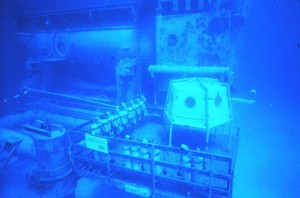Posts
Aquarius — World’s Last Undersea Lab — Loses Funding, Faces Decommisioning
/in Featured, Ocean Newswire/by Ocean DoctorFor 25 years, the Aquarius Reef Base, an undersea laboratory that sleeps six?off of Key Largo, has served as host to numerous marine biologists and NASA astronauts. Even the Ocean Doctor has paid a visit to Aquarius. But after years of declining budgets, the Obama administration has eliminated the base’s funding, and the world’s last remaining undersea lab is faced with decommissioning — or finding its own funding. NPR reports that Dr. Sylvia Earle and other researchers are now conducting a mission of outreach and education in Aquarius to help save it.
NOAA Offers ‘How Do We Explore’ – A Free Online Ocean Exploration Course for Teachers and the Public
/in Ocean Newswire/by Ocean DoctorA free online educational workshop for formal and informal educators, ocean explorers, scientists and other interested members of the public will be available from NOAA later this month.
NOAA News Releases
Note: Newswire stories are provided as a courtesy of OceanDoctor.org. Content of these articles is provided by external sources.
Video: State of the Oceans Forum: A Call to Action
/in Events, Featured/by Ocean Doctor_A Special ExpeditionCasts Presentation: State of the Oceans : A Call to Action. With its growing focus on conservation, the Explorers Club hosted its first-ever State of the Oceans Forum, featuring a panel of ocean explorers/scientists offering a range of perspectives on the state of our oceans today and the actions we must take in order to restore and sustain them. The panel was held on Sunday, March 22, 2009 at the Explorers Club’s World Center for Exploration in New York City. (You can watch this video below or on your iPod or compatible MP3/video player by subscribing free to ExpeditionCasts in iTunes.)
Read more
Podcast: Play in new window | Download
Video: Lessons from Ocean Explorers – Why Conservation Needs Exploration
/in Events, Featured/by Ocean Doctor_
A Special ExpeditionCasts Presentation: Lessons from Ocean Explorers: Why Conservation Needs Exploration. Renowned ocean explorers and adventurers gathered at the Carnegie Institution for Science on March 7, 2009 to kick off the Blue Vision Summit, a project of the Blue Frontier Campaign. With stunning imagery and stories from the deep, this unique panel discusses the importance of ocean exploration, its future, and how exploration is vital to the advancement of the conservation of the oceans. (You can watch this video below or on your iPod or compatible MP3 player by subscribing free to ExpeditionCasts in iTunes.) Read more
Podcast: Play in new window | Download
Filmmakers Honored for Film, Arctic Tale
/in Featured, News & Announcements/by Ocean Doctor_Breathtaking Imagery, Touching Story Brings Awareness of Global Warming’s Arctic Impacts to Millions
 |
|
Sarah Robertson and Adam Ravetch are presented with the Lowell Thomas Award at The Explorers Club in New York (Photo by David E. Guggenheim) |
NEW YORK, New York — Our good friends and colleagues Adam Ravetch and Sarah Robertson of Arctic Bear Productions and the Arctic Exploration Fund made their Hollywood directorial debut this year with the hit, feature  length, theatrical film ARCTIC TALE. They were recently honored for this important achievement, and the important conservation message the film conveys, with the presentation of the prestigious Lowell Thomas Award at the Explorers Club in New York. The award is named in honor of famed adventurer and broadcast journalist Lowell Thomas and is awarded to those who have pushed the limits of discovery, knowledge and human endurance and have excelled in communicating the importance of exploration and the field sciences to the general public. Read more
length, theatrical film ARCTIC TALE. They were recently honored for this important achievement, and the important conservation message the film conveys, with the presentation of the prestigious Lowell Thomas Award at the Explorers Club in New York. The award is named in honor of famed adventurer and broadcast journalist Lowell Thomas and is awarded to those who have pushed the limits of discovery, knowledge and human endurance and have excelled in communicating the importance of exploration and the field sciences to the general public. Read more
Exploration of Pribilof Canyon Now Under Way, Revealing Rich Ecosystem, Corals
/in Bering Sea Expedition, Featured, Ocean Doctor's Reflections, Projects & Expeditions/by Ocean Doctor
Deepwater corals, like this sea whip (Halipteris willemoesi) photographed on Sunday by Timo Marshall, thrive in the deep waters of Pribilof Canyon
Thanks to great weather, state-of-the-art equipment and a top-notch crew, it has been a productive weekend for the team aboard Esperanza which arrived on site at Pribilof Canyon Saturday morning (July 28) when David Guggenheim and Michelle Ridgway made the first tandem dive in two DeepWorker submarines into Pribilof canyon to a depth of just over 1,000 feet and began to document a fascinating diversity of life, including a variety of corals, anenomes, sponges and fish. On Sunday, the ship visited a second site in Pribilof Canyon where John Hocevar and Timo Marshall completed a successful tandem dive, documenting more corals and successfully collecting a number of specimens with DeepWorker’s manipulator arm for analysis by scientists around the world.

John Hocevar (Greenpeace Senior Oceans Specialist) pilots DeepWorker at 1,100 feet in Pribilof Canyon
(Video still by Timo Marshall – 29 July 2007)
Already, the Greenpeace-led team has accumulated nearly 16 hours of bottom time (8 hours per sub), more than all of the previous research done in this region combined. The subs’ high-definition video cameras have already collected over 120 Gb of data. The subs are performing linear transects which will then be analyzed on the video. Twin lasers spaced 20 cm apart allow accurate analysis of the size of organisms encountered. Read more
Fax: +1 (202) 888-3329
P.O. Box 53090
Washington, DC 20009
Just Released: The Remarkable Reefs of Cuba: Stories of Hope from the Ocean Doctor by Dr. David E. Guggenheim, President of Ocean Doctor


